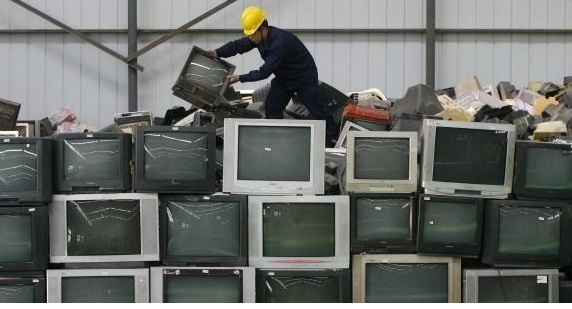TV recycling is one of the ways to make money from your old televisions. TVs widely known as televisions are one of the most commonly used home appliances in the world.
According to research, 97% of homes have a TV, and the remaining 3% are probably thinking of buying one someday.
But what happens when these TVs get spoiled beyond repair? Should they be disposed of at landfills or dumped in the backyards of houses or stores?
According to plastic experts in the UK, TVs are typically taken to electrical waste processing centers.
They go through some processes to ensure that the plastic, glass, and other materials are properly cared for.
The majority of televisions are made of recyclable plastics such as glass and aluminum. Approximately 98% of a TV can be recycled.
There are various ways involved in the TV Recycling process.
Read Also: Glass Recycling Process – Step by Step Guide
This article is about the various methods involved in the recycling of TVs as listed below;

1. Collection of the TVs
The first step involved in the TV recycling process is the collection stage. At this stage, all types of TVs are collected from various sources.
For example, a recycling company may decide to open a collection firm for TVs found in the area.
Additionally, local scrap buyers can also serve as a means of collecting TVs for recycling, while some refurbish and sell them out.
At the collection stage, most people don’t usually get to donate their TVs to recycling centers.
Maybe they have little knowledge about the recycling companies within their locations.
However, Google has made it easier for people to get in touch with these firms for a pickup.
Additionally, before ordering a pickup, it’s advisable to learn more about the company and whether or not you will pay for the services they are offering.
Read Also: 4 Batteries Recycling Process Complete Guide
2. Sort them Out
The second stage involved in the recycling process is to sort them out. There are different types of TV, and each TV has different materials that make it up.
For instance, a TV is made up of glasses for the screen, rubber for the body or any other material, and lastly, steel, copper, and more.
When sorting them out, the TVs are smashed into different parts to separate all the valuable materials.
At this stage, the materials recovered from the smashed TV are categorized by their type and quality.
It’s, therefore, necessary to smash up the TV to extract those valuable items from it. Without this process, there is no way it could be recycled.
Read Also: 12 Step Guide to Starting a Successful Business
3. The Overall Stage
This is the last stage of the television recycling process.
After the TVs are collected from various locations, smashed up to extract valuable materials, and the materials are categorized by their type, the next stage involved is to start recycling, which is also known as the overall stage.
Collected materials are to be transported to various recycling companies for their purposes.
For instance, plastic recovered from a TV can be transported to a recycling firm that recycles plastics.
Either they refurbished the plastic into a new one, or they used it for the production of other products.
The same can be done for both copper and steel and other valuable materials obtained from them.
However, sometimes, companies recycling TVs retain all it takes to get the recycling done at their firm.
They don’t need to be transported anywhere. Additionally, if you are looking for a tv recycling near me/you (best buy tv recycling or tv recycling center near me/you), you can find them online, or contact your TV manufacturing company for due process.

